
 |
St Theodore'sWattle Park |
|||
|
| ||||
| Sermon of the Week |
| |
| 25/2/07 | ||
| The Perished Kingdom | Gen 3:1-25 |
|
|
||||
 One of the most exquisite pieces of sculpture created by the great artist, Michelangelo, was the sculpture called the Pieta. It depicts Mary holding a dead Christ in her arms after he was taken down from the cross. Michelangelo carved it from a single slab of marble in less than two years. It stood on open display in St Peter's in Rome for many years until in 1972, a mad Australian Geologist named Laszlo Toth took to it with a hammer. He managed to break off the Virgin's arm at the elbow, knocked off a chunk of her nose, and chipped one of her eyelids before being stopped. As a result this beautiful work of art appeared to be damaged beyond saving. You can imagine how people were feeling as they surveyed the damage. How could such a beautiful creation be so badly damaged by someone for no apparent reason? What are we going to do with it? How could it ever be restored to its original glory? One of the most exquisite pieces of sculpture created by the great artist, Michelangelo, was the sculpture called the Pieta. It depicts Mary holding a dead Christ in her arms after he was taken down from the cross. Michelangelo carved it from a single slab of marble in less than two years. It stood on open display in St Peter's in Rome for many years until in 1972, a mad Australian Geologist named Laszlo Toth took to it with a hammer. He managed to break off the Virgin's arm at the elbow, knocked off a chunk of her nose, and chipped one of her eyelids before being stopped. As a result this beautiful work of art appeared to be damaged beyond saving. You can imagine how people were feeling as they surveyed the damage. How could such a beautiful creation be so badly damaged by someone for no apparent reason? What are we going to do with it? How could it ever be restored to its original glory? |
|
| The first two chapters of Genesis both end on the same note: 1:31: "God saw everything that he had made, and indeed, it was very good. And there was evening and there was morning, the sixth day." Gen 2:24-25: "Therefore a man leaves his father and his mother and clings to his wife, and they become one flesh. 25And the man and his wife were both naked, and were not ashamed." The world that God had made was a creation far more beautiful than the Pieta. It's perfection extended to every conceivable dimension. As we saw last week the man and the woman were in perfect harmony with each other, with the world around them and, most importantly, with God. And so it might have remained, except that, into this perfect creation, rebellion is about to enter. Well, in fact rebellion has already begun in the spiritual realms. | |
| The serpent here isn't your ordinary garden variety snake. I understand from what some people say that snakes have an unfair reputation. That in fact they're much nicer animals than some people think. Well, I'm willing to accept that that's a possibility, but in this case the serpent is something different. Here, the serpent is the mouthpiece for Satan, sent to tempt the man and woman to disobey God. And we're told he was very subtle, very crafty, in the way he went about it. | |
| His aim is to break up this happy situation, to turn the man and woman away from their obedience, their allegiance to God. But look at how he does it. He doesn't approach the issue front on. He doesn't just say, "Forget God, come with me and have some fun." That's what he often says to people today. But here it's much more subtle. He begins by asking a question that's intended to lead the woman away from the truth. It's what's called, in political circles, push-polling. Asking a question that's worded in such a way that it makes you think along a certain line. "He said to the woman, 'Did God say, "You shall not eat from any tree in the garden"?'" The implication of the question is that God is being harsh, unkind, keeping good things away from them. It's one of the techniques that's used in advertising all the time. Trying to make you think that you're missing out, that the service you're getting or the consumer good that you own already is a bit out of date, or a bit short on features, due to be replaced with something that the cool people are using or wearing, or driving. | |
| The devil doesn't lie at this point, notice. A lie would be to easy to recognise. Rather he merely misdirects. Pushes the woman to wonder whether God can be trusted. | |
| Her answer is a good one up to a point; except that she adds to God's command. Can you see the bit she adds in? "We may eat of the fruit of the trees in the garden; 3but God said, 'You shall not eat of the fruit of the tree that is in the middle of the garden, nor shall you touch it, or you shall die.'" This is a classic bit of religious development. God has made one rule, but she or her husband have added in another. God says you mustn't eat of it. They've added "you must not touch it." Like many religious rules, it makes good sense: if you don't touch it you can't eat it. But touching it wasn't part of the rule. | |
| This week is a good time to be thinking about this sort of thing, because we've just entered the season of lent and what have people been talking about all week? What are you giving up for lent? I even read that KFC has a special fish meal on offer for lent. Now can I just say that I did a search in my Bible program and lent is found three times in the Bible and every time it has to do with borrowing something. Not once does it mention fasting, or giving up things for 7 weeks while we think about Easter. It especially doesn't mention eating fish, though it's true that the disciples and Jesus ate fish - but then that was after the resurrection, not before Good Friday. | |
| Now fasting during lent may be a good thing for various reasons, but we mustn't ever do it because it's one of the rules we have for being more godly. There's only one way to be more godly and that's to ask God to fill you with his Holy Spirit so he can make you more godly. | |
| But back to Genesis 3. Satan jumps in as soon as the woman explains the rule. He's seen a loophole. "4But the serpent said to the woman, 'You will not die; 5for God knows that when you eat of it your eyes will be opened, and you will be like God, knowing good and evil.'" He realises, first of all, that the fruit isn't poisonous. Like everything else in the garden it's good. Even the woman realises it's good for food. But he also sees the essence of God's prohibition. If they eat this fruit they'll understand what it is to do evil. They've already experienced good. Everything around them is good. But what about evil. Only God can recognise that. Well, God and Satan, I guess, though he doesn't mention that last bit. | |
| This is the crux of the temptation: will they continue to trust God, to let him worry about what's good and what's evil or will they insist on making their own decisions, being their own guides, taking control for themselves. | |
| If you remember back to last week, this was the core issue wasn't it? Yes, the picture of the blessed world involved right relationships with the environment and with each other, but the core issue was their relationship with God. Would they continue to trust him to do what was best for them? Would they acknowledge their complete dependence on God for everything good? Would they demonstrate this faith in God by obeying this one commandment? | |
| Sadly the devil's temptation hit its mark: "6So when the woman saw that the tree was good for food, and that it was a delight to the eyes, and that the tree was to be desired to make one wise, she took of its fruit and ate; and she also gave some to her husband, who was with her, and he ate." The devil has managed to turn the woman's eyes away from God to herself, to her own needs and desires. Here is the essence of sin: she sees what the fruit can do for her and she wants it. It satisfies the stomach, it pleases the eye, the aesthetic side of her nature, it satisfies her intellectual pride and her desire for self esteem, this will make her wise - like God - and so she eats. And so does her husband who was with her. Notice that it isn't just the woman who acts. They're in it together. And suddenly the whole scene is wrecked. Suddenly they realise that something is wrong. Suddenly nakedness has a whole different meaning to them. | |
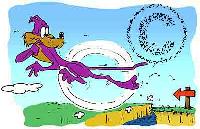 I'm reminded of one of those cartoons I used to watch when I was much younger: where Wile E. Coyote would be running so fast chasing the road runner that he wouldn't notice the cliff up ahead and he'd go straight out. You'd see him hanging in the air with his legs pumping as he suddenly realises that there's nothing under his feet. In a sense he's totally naked. And then he plummets to the ground. I'm reminded of one of those cartoons I used to watch when I was much younger: where Wile E. Coyote would be running so fast chasing the road runner that he wouldn't notice the cliff up ahead and he'd go straight out. You'd see him hanging in the air with his legs pumping as he suddenly realises that there's nothing under his feet. In a sense he's totally naked. And then he plummets to the ground. |
|
| Well that's what it's like here. They realise they're naked and hastily sew fig leaves together to cover themselves up. | |
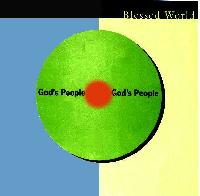 Here we see the first evidence of the relationships breaking down. There's more to come, but right from the start they feel the need to hide from each other, to cover up their bodies. The relationship of mutual love and comfort is compromised. Here we see the first evidence of the relationships breaking down. There's more to come, but right from the start they feel the need to hide from each other, to cover up their bodies. The relationship of mutual love and comfort is compromised. |
|
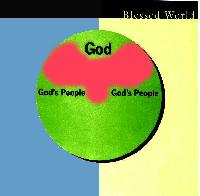 Similarly as God comes walking in the garden in the cool of the evening, what do they do? They hide themselves among the trees. They're afraid to face God, even though he's always been their friend, even though he's given them everything they could desire. But their disobedience has broken that relationship as well. Similarly as God comes walking in the garden in the cool of the evening, what do they do? They hide themselves among the trees. They're afraid to face God, even though he's always been their friend, even though he's given them everything they could desire. But their disobedience has broken that relationship as well. |
|
| As God begins to question them you see the breakdown of relationships in full view. The man blames the woman, but at the same time puts some of the blame back onto God. She's the woman God gave him. Everything would have been OK if God hadn't provided this woman as a helper for him. "Big help she's been!" And the woman in her turn blames the serpent. | |
| We're very good at deflecting blame aren't we? I find it's a very rare occurrence that I do anything that I'm completely responsible for. I can usually find someone else to pass the blame on to and I'm usually pretty sure I'm right! So here, the woman blames the serpent and the serpent, of course, hasn't got a leg to stand on! | |
| So God proclaims a curse on the serpent, From now on he'll be cursed among all wild animals, he'll crawl on his stomach, etc. But most importantly, there'll be enmity between him and the woman and their descendants from that day on. Now he's not just talking about the way people fear snakes. What this is really about is the enmity between Satan and humanity and especially one particular human being. When God says "he will strike your head, and you will strike his heel", it's a prefiguring of the cross, where Satan does his best to kill off Jesus, but Jesus rises victorious and in the process takes away Satan's power forever. | |
| God then turns to the woman and pronounces the curse that she will bear from now on: "I will greatly increase your pangs in childbearing; in pain you shall bring forth children, yet your desire shall be for your husband, and he shall rule over you." The result of her rebellion is that the relationship between her and her husband is broken down. From now on they'll be fighting for supremacy in their relationship, instead of working together as complementary sides of an equal partnership. And her relationship with creation is broken down within her own body. Even the natural process of childbirth will now be a source of pain. | |
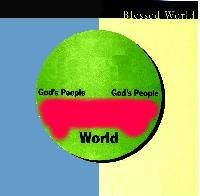 To the man God says "Because you have listened to the voice of your wife, and have eaten of the tree about which I commanded you, 'You shall not eat of it,' cursed is the ground because of you; in toil you shall eat of it all the days of your life; 18thorns and thistles it shall bring forth for you; and you shall eat the plants of the field. 19By the sweat of your face you shall eat bread until you return to the ground, for out of it you were taken; you are dust, and to dust you shall return." Here we see the full force of the breakdown in their relationship with the earth. The man is still there to till the ground, but now it'll be hard work and the land won't be as easy to control as it was. In fact the opposite. It's almost as if the earth is now set on making it as hard as possible for the man, bringing forth thorns and thistles. And only by hard work and sweat will the man be able to feed himself and his family, until the day when God's warning comes true, when they return to the ground from whence they were taken. Suddenly being made from dust takes on a whole new meaning. Previously it simply implied that we were an integral part of creation, but now it reminds us of the transitory nature of our existence. "You are dust, and to dust you shall return." To the man God says "Because you have listened to the voice of your wife, and have eaten of the tree about which I commanded you, 'You shall not eat of it,' cursed is the ground because of you; in toil you shall eat of it all the days of your life; 18thorns and thistles it shall bring forth for you; and you shall eat the plants of the field. 19By the sweat of your face you shall eat bread until you return to the ground, for out of it you were taken; you are dust, and to dust you shall return." Here we see the full force of the breakdown in their relationship with the earth. The man is still there to till the ground, but now it'll be hard work and the land won't be as easy to control as it was. In fact the opposite. It's almost as if the earth is now set on making it as hard as possible for the man, bringing forth thorns and thistles. And only by hard work and sweat will the man be able to feed himself and his family, until the day when God's warning comes true, when they return to the ground from whence they were taken. Suddenly being made from dust takes on a whole new meaning. Previously it simply implied that we were an integral part of creation, but now it reminds us of the transitory nature of our existence. "You are dust, and to dust you shall return." |
|
So now the picture of God's world is shattered. God sends them out of the garden, out of the place of his blessing, to live in a world in need of renewal. Now the world is like a house that's got so run down that the only solution is to knock it down and rebuild it from scratch. Like a house that the council has placed a condemned sign on. The world needs to be rebuilt. Now the man and woman are sent out to live in the condemned world until the day when God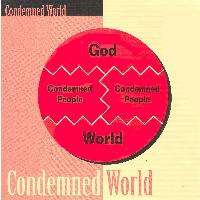 rebuilds. Into a world that's represented by this picture. Mind you, as we look at this picture we also need to notice that God is still caring for them. This is a hint of what will come later. He provides them with clothes to cover themselves and he puts the angel at the gate of the garden to protect them, so they won't eat of the tree of life and live in this fallen state forever. Physical death at this point is part of God's provision for us, as sad as that may so often be rebuilds. Into a world that's represented by this picture. Mind you, as we look at this picture we also need to notice that God is still caring for them. This is a hint of what will come later. He provides them with clothes to cover themselves and he puts the angel at the gate of the garden to protect them, so they won't eat of the tree of life and live in this fallen state forever. Physical death at this point is part of God's provision for us, as sad as that may so often be |
|
| I didn't finish telling you the story of the Pieta, did I. After our mad Australian took to it with his hammer it was left shattered, in pieces. But that wasn't the end. It's such a beautiful and valuable piece of sculpture that the curators at St Peter's took it away and painstakingly restored it, gluing pieces back in place, smoothing out the chipped off marble, until finally they were able to place it back in St Peter's Cathedral, as good as new, mind you, this time behind a plate glass wall. | |
| What they did is a little like what God set out to do when Adam and Eve were sent out from the garden. He began to rebuild his blessed world. Next week we'll see how he chose Abram to form the nucleus of a new nation who would be his special people, called to live in his special place, to relate to him and to each other in such a way that they would rebuild the world as he intended it to be. But that's for next week. | |
Notes and Questions |
|
| User's guide to the Bible 3 - The Perished Kingdom | |
Background Information |
|
|
|
|
|
| Satan seeks to undermine Adam and Eve's trust in the goodness of God (vs 1 - "Did God say?") and he gets them to question God's word (vs 4 - "You will not die"). Adam and Eve did not need to eat of the tree of the knowledge of good and evil, for God had already given them everything good, but in eating the fruit they chose to decide for themselves what was good for them. Their sin was in wanting to take on the role of God for themselves, and this has been the very essence of sin ever since (Romans 1:19-25). | |
|
|
|
|
|
|
|
|
| 1.Read Genesis 3:1-5. What tactics does the serpent use to tempt Eve? What progressions do you see? |
|
| 2.How do we see Satan using the same tactics today? |
|
| 3.In verse 6 what is the nature of Adam and Eve's sin? In what ways are we guilty of the same thing? |
|
| 4.What immediate impact does Adam and Eve's sin have on their relationship with God? How are their responses now the normal reaction of all people? What difference might knowing this make to our Christian witness to others? |
|
| 5.In Genesis 1-2 God established a certain order in his creation – He is in authority over the man and woman who work together as equal and complementary partners, ruling over the rest of creation. Compare this to what happens in Genesis 3. What do you notice? |
|
| 6.Read Genesis 3:14-24. What does God's punishment mean for: | |
|
|
| 7. What signs of hope can we see in the passage? |
|
|
|
|
|
|
|
 |
 |
|
| ||||
Contact us |
Check our Mission Statement |
Our Mission Strategy |
Our 5-Year Plan |
Preaching Program |
Home |
Last Week's Sermon |
Next Sermon in the series |
Index of Sermons |
Receive each week's |